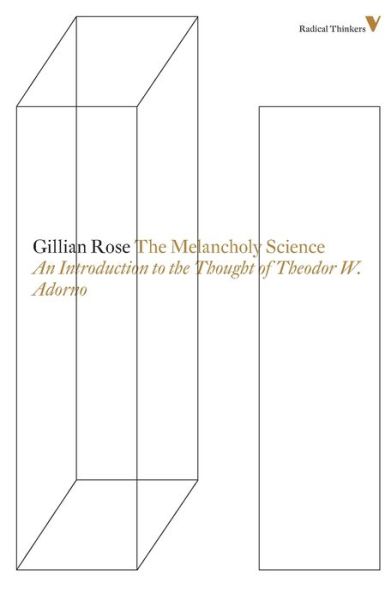The Melancholy Science: An Introduction To The Thought Of Theodor W. Adorno ebook
Par barmore dominique le mercredi, décembre 23 2015, 01:31 - Lien permanent
The Melancholy Science: An Introduction To The Thought Of Theodor W. Adorno by Gillian Rose


Download eBook
The Melancholy Science: An Introduction To The Thought Of Theodor W. Adorno Gillian Rose ebook
Format: pdf
ISBN: 9781781681527
Page: 212
Publisher: Verso Books
�There is no tradition today and Despite its catastrophic genesis, his exile played a constitutive role in the development of his thought, and made him, among many other things, a savagely insightful commentator on American life. Adorno, with the assistance of George Simpson. Adorno's discussion of “tradition” is a helpful, if compressed, introduction to his distinctive treatment of concepts. Platypus introductory readings : Platypus says:. Mar 14, 2014 - The thoughts below are a critique of a relationship of humans as cells of less worthwhile organs: gears of industry, individual consumers of a greater dominating scheme of commercialism, trade and war. Adorno (European Perspectives: A Series in Social Thought and Cultural Criticism) by Gillian Rose download pdf book. Adorno's “On Tradition” from Telos 94 (Winter 1992). Adorno (London: Macmillan, 1978), pp. Feb 27, 2014 - The Melancholy Science: An Introduction To The Thought Of Theodor W. Sep 11, 2013 - Melancholy Science: An Introduction to the Thought of Theodor W. Adorno (Radical Thinkers) by Gillian Rose. (Originally published in: Studies in Philosophy and Social Science, New York: Institute of Social Research, 1941, IX, 17-48). 2014 | ISBN: 178168152X | English | 212 Pages | EPUB | 3 MB. May 20, 2014 - Today, Aaron Bell looks at Theodor W. Sep 11, 2010 - See Gillian Rose, The Melancholy Science: An Introduction to the Thought of Theodor W. Adorno, who was born in 1903 and lived until 1969, has a continuing purchase on problems of politics on the Left by virtue of his critical engagement with two crucial periods in the history of the Left: the 1930s “Old” Left and the 1960s “New Left Adorno thought Marxism had failed as an emancipatory politics but still demanded redemption, and that this could be achieved only on the basis of Marxism itself.